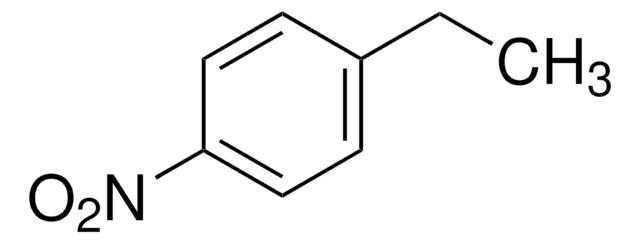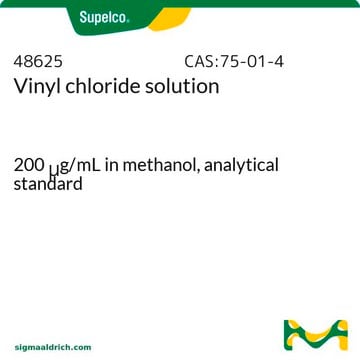04943
4-Ethyltoluene
≥95.0% (GC)
Synonym(s):
1-Ethyl-4-methylbenzene, p-Ethylmethylbenzene
Sign Into View Organizational & Contract Pricing
All Photos(1)
About This Item
Linear Formula:
C2H5C6H4CH3
CAS Number:
Molecular Weight:
120.19
Beilstein:
1903007
EC Number:
MDL number:
UNSPSC Code:
12352100
PubChem Substance ID:
NACRES:
NA.22
Recommended Products
Quality Level
Assay
≥95.0% (GC)
autoignition temp.
887 °F
refractive index
n20/D 1.495 (lit.)
n20/D 1.496
bp
162 °C (lit.)
density
0.861 g/mL at 25 °C (lit.)
SMILES string
CCc1ccc(C)cc1
InChI
1S/C9H12/c1-3-9-6-4-8(2)5-7-9/h4-7H,3H2,1-2H3
InChI key
JRLPEMVDPFPYPJ-UHFFFAOYSA-N
Looking for similar products? Visit Product Comparison Guide
Related Categories
Signal Word
Danger
Hazard Statements
Precautionary Statements
Hazard Classifications
Asp. Tox. 1 - Flam. Liq. 3
Storage Class Code
3 - Flammable liquids
WGK
WGK 3
Flash Point(F)
109.4 °F - closed cup
Flash Point(C)
43 °C - closed cup
Personal Protective Equipment
dust mask type N95 (US), Eyeshields, Gloves
Choose from one of the most recent versions:
Already Own This Product?
Find documentation for the products that you have recently purchased in the Document Library.
R Swiercz et al.
International journal of occupational medicine and environmental health, 13(4), 307-315 (2001-03-30)
The toxicity of 4-ethyltoluene to experimental animals was studied after single and repeated exposures. It was found that 4-ethyltoluene can be classified as a very mild skin and eye irritant. Sensory respiratory irritation of 4-ethyltoluene was studied in Balb/C male
E Janik-Spiechowicz et al.
Mutation research, 417(2-3), 95-100 (1998-09-12)
A combination of assays for gene mutations in Salmonella typhimurium TA97a, TA98, TA100 and TA102 strains with and without rat liver activation, and for micronucleus and sister chromatid exchange (SCE) in bone marrow cells of Imp:Balb/c mice was used to
T Tomas et al.
Medycyna pracy, 48(3), 307-315 (1997-01-01)
The study aimed at evaluating the effect of 4-ethyltoluene and pseudocumene on the central nervous system and comparing the obtained results with those presented earlier. The effect of the study compounds was assessed on the basis of changes in spontaneous
Alessandro Scarso et al.
Journal of the American Chemical Society, 125(46), 13981-13983 (2003-11-13)
Reversible coencapsulation of a solute molecule and a single solvent molecule takes place in solution at ambient temperature. Two isomeric complexes are formed (social isomers), and their relative energies are assessed by NMR methods. Intermolecular interactions between 3 aromatic solutes
Alan P Graves et al.
Journal of medicinal chemistry, 48(11), 3714-3728 (2005-05-27)
Molecular docking is widely used to predict novel lead compounds for drug discovery. Success depends on the quality of the docking scoring function, among other factors. An imperfect scoring function can mislead by predicting incorrect ligand geometries or by selecting
Our team of scientists has experience in all areas of research including Life Science, Material Science, Chemical Synthesis, Chromatography, Analytical and many others.
Contact Technical Service









